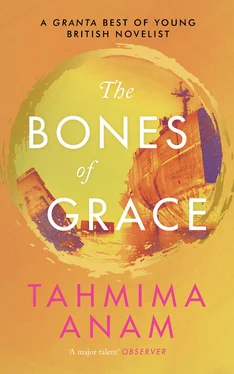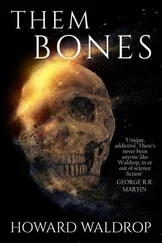I get along without you very well
Of course I do
Except when soft rains fall
I lay down on the sofa and gazed up at the ceiling. Nanu’s chandelier swam above me. I could hear the crude violin chords of her soap opera.
I’ve forgotten you just like I said I would
Of course I have
Or maybe except when I hear your name
Someone’s laugh that’s just the same
I turned off my phone and stuffed a pitha into my mouth, washing it down with a swallow of cold tea. The cook came to take the tray away, but I waved her off. I bit into an apple. After what felt like a long time, Nanu returned.
‘You won’t believe,’ she said. ‘A car accident, and mother-in-law dead.’
‘She’ll come back.’
‘No. The car was burnt, everything.’
‘You’ll see.’
‘Why are you lying down?’ She put her hand on my forehead. ‘Are you feeling okay?’
‘Don’t worry.’ I looked at my phone. ‘I have to go.’
‘Go, go. Or traffic will eat you.’
‘I’ll come next week.’
‘Come just before prayers, the streets will be empty then.’
She unlocked the door. ‘Bye, Nanu-jaan.’
‘Have you told your mother?’
‘Not yet.’
‘Tell her quickly. You know I can’t keep a secret.’
Diana’s femur is encased in a thick layer of matrix. Suzanne and I have been debating the best way to prepare it, and I have persuaded her to use an acid treatment. She makes a three per cent acetic acid dilution and we slowly lower the femur into it. Then we place it under the hood and wait for the acid to do its work. It has to be watched carefully; as soon as it dissolves the final layer of matrix, it has to be removed, and the acid washed numerous times. We want it to eat through the matrix but leave Diana in peace.
Suzanne continues to pare away at the ankle bone with a tiny chisel. It’s slow work, but she doesn’t seem to mind. She chips away, fragment by red fragment, until we see the white of bone. Then she uses a brush from a make-up bag she never lets me touch to clear the last layer of dust. Every few hours we step back and admire her, and the world that preserved her so perfectly, pristine bones and her exquisite red blush.
Bettina has invited me to spend Thanksgiving with her parents, so tomorrow I will take the bus down to New York. I wanted to stay at the lab but I was afraid that, with Cambridge vacant, I would spend the entire weekend wandering the streets, calling out your name. It is too soon to let my desperation get the better of me. Until you hear the whole story, there’s no point bumping into you on the street and cracking my chest open as you brush past me, or, worse, pretend not to know me at all. I haven’t really even begun, and there is also Anwar, waiting in the wings, with his own story.
Let me tell you, instead, about one of my ancestors. My great-great-uncle Kashiful Muslehuddin Ali, whose nickname was Khoka, had once loved a Jewish girl. All his life the family believed there was something not quite right about Khoka: he was overly sentimental, lamenting the number of indentured farmers that starved when the harvest was lean, that he fussed over the goats when they died of the cold, that he moaned over the waste of food whenever there was a banquet. His mother believed it was because he had spent too long in the birth canal, her most difficult labour, and when Khoka came out, he was blue in the face and didn’t seem to have any life in him. In fact, the midwife had pronounced him dead, and his mother had curled herself onto the bed when she heard a small cry coming from the black-and-white-tiled floor where they had left him. When he came of age and refused to behave like a man, she blamed that blue tone for making her spoil him.
Years later, unmarried and without a vocation, having proven himself unable to handle either the family accounts or the management of the estate, Khoka took a flat in Calcutta, where he purchased a motorcar and frequented the theatre and Firpo’s, a restaurant on Chowringhee Road. It was at Firpo’s that he met Rachel Mosel, a Jewish-American dancer who had come at the behest of the proprietor, Signor Firpo himself, to teach the young women of Calcutta how to dance. The specially sprung floor at Firpo’s, which was much advertised in the newspapers of London, was shamed by the badly executed foxtrots of the women of Calcutta. Even the very modern ones, who came in dresses rather than saris, danced badly; so did some of the memsahibs who had been too long in India — their ankles were graceless, their arms flapped about without purpose. So Miss Mosel, who Signor Firpo had met in New York, was drafted in for this very special and delicate task, and, that is when Khoka met her, and for some reason no one in the family was able to fathom, she chose him from among all the young men who instantly fell in love with her.
When Khoka brought Rachel to the estate in Bardhawan — when it was still at its glorious peak, when the Grand Trunk Road was indeed very grand, and the Howrah — Delhi railroad track was still pristine, before my great-grandfather mortgaged the estate, then sold it, before the family’s fortunes declined swiftly under the influence of gambling and speculation — his mother regarded Khoka and decided that perhaps there was something enchanting about the gentle slope of her son’s forehead and his full-petalled mouth, and that Miss Mosel would have been charmed by the way he noticed every beautiful thing. But this new awareness did not make Khoka’s mother agree to the match. She marshalled the family against him, cut off his allowance, sold his Daimler, and stood over his head while he wrote to Rachel to break off the engagement. I regret to inform you, my dear Miss Mosel, that it will not, after all, be possible for me to marry you . Twelve hours after the letter had been dispatched, Khoka walked to the railway station, removed his neckerchief and lay down on the tracks, letting the 6.05 Delhi train, which was then called ‘the Spear of Kali’, glide over his slight frame like a spoon through Signor Firpo’s famous Scotch broth. And there ended the sad romance of Kashiful Muslehuddin Ali, the only man in the history of my family to have ever ventured beyond the boundaries of his home in search of love.
Although I had agreed to marry Rashid, we would not be officially engaged until we’d made a public announcement, and, before that could happen, we had to have a party. It was decided that we’d have it at Rashid’s house, which was five minutes away on the other side of Gulshan Avenue.
When they first moved to this part of town over twenty years ago, Dolly and Bulbul had built a modest bungalow with a lawn at the front and back. As Bulbul’s business expanded — into steel-making, glass-making, shipbuilding — so did the house. Dolly was constantly renovating, exchanging the shuttered windows for aluminium frames, putting marble floors in place of mosaic tiles. Soon other buildings sprouted up on either side of them, and their rooms were plunged in darkness, so instead of tearing the house down and starting all over again, they simply added to the original building, leaving the lower floors to the servants and poor relations from the village. Bulbul had political aspirations, dreamed of someday using the space to hold district meetings, and to this end, he’d had the floors replastered in red to evoke the wide, colonial-style buildings in which such meetings had been held for generations, peasants squatting on polished cement floors and pleading with the Big Man.
Dolly answered the door herself, wearing a spun-sugar concoction of a sari that seemed to make her seem perfectly round from almost every angle. She was beautiful in an exaggerated sort of way, with big, bulging eyes and a full mouth. Behind her, the hallway was lit by a giant chandelier. She stood back and looked me up and down. ‘Oh, I’m so glad you wore the pink jamdani,’ she said, ‘it goes so well with the set.’ Earlier that day, she had sent over a rectangular red box that contained a pair of bell-shaped gold earrings and a matching necklace, the arrival of which had prompted a trip to the beauty parlour. ‘You can’t see the earrings if you don’t put up your hair,’ Ammoo had said. Dolly led us up the stairs and to the roof terrace on the top floor, where her husband was sipping whisky with his feet submerged in the swimming pool they’d had installed earlier that year. The floodlights and the water enveloped us in a pulsating blue gauze.
Читать дальше












